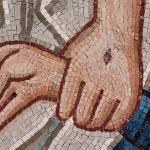“I would like churches to talk about mental health the same ways we talk about every other health challenge. I would like us to combine prayer with other medical and social services that help people. I would like for us to affirm that health challenges are not a reflection of the depth of one’s faithfulness. I’d like us to cultivate communities that can hold grief, pain, anxiety and the inexplicable without sacrificing individual or cultural dignity.” — Monica Coleman, pastor, professor and author
I first met the Rev. Dr. Monica Coleman at a “Theology after Google” conference at the Claremont School of Theology nearly seven years ago. Her talk was on “finding Easter in the Google-verse” and I remember being particularly struck by her passionate presence and spirit. I’ve often reached out to Monica since to write for us at Patheos, and the more I’ve learned about her, especially with regards to her lifelong journey with trauma and depression, the deeper my fondness and respect has become. Her blog on faith and depression, graciously named The Beautiful Mind Blog, is a salve for many Christians struggling with mental illness. Over the years, she has also inspired me with her passion for her scholarship, for the Black Church, for parenting, and for her healthy and holistic cooking, which she often shares about through photos and recipes on her Facebook page.
Dr. Coleman teaches theology and African-American religions at Claremont School of Theology in Claremont (CST), CA, and was recently promoted to the position of full professor—making her the first African-American woman full professor at CST. Her writings cover the topics of sexual and domestic violence, mental health and religious pluralism. She is also an ordained minister in the African Methodist Episcopal Church and a sought-after speaker and preacher. In 2005, The African American Pulpit named Coleman one of the “Top 20 to Watch—The New Generation of Leading Clergy: Preachers under 40.”
Coleman’s newest book, Biploar Faith, is both a spiritual autobiography and memoir of madness — the book she says she was hoping to find when she was first diagnosed with bipolar II, a mental illness. “There are few memoirs about any kind of depression written by African-Americans,” Coleman says about the book, “and none on living with bipolar II. I really wanted to show how my cultural history made a difference in how my family understood and experienced depression.”
We invited Coleman to share more about her work, her faith and her new book as part of our Patheos 10+1 Q&A series, in which we ask the same 10 questions of Christian game-changers and thought-leaders who are inspiring us today. Monica’s responses are below.
What, in the broadest sense, is your work in the world?
My work is to teach a faith that liberates individuals and communities into knowing that they can be true to their experiences in the world while being deeply faithful and striving for justice. I do this when I’m teaching theology and philosophy to graduate students and we examine the diversity of religious traditions or construct theology that is transformative for today’s context. I also do this in public lectures, workshops and sermons when I speak out about how experiences of mental health and violence shape our lives, work and faith.
 What are you most energized by, professionally or personally, at the moment?
What are you most energized by, professionally or personally, at the moment?
I am energized most by the opportunities I have to offer other people the things I so desperately needed. Sometimes I get to tell a story of how one can live beyond trauma and pain with a deep faith and cultural connection. Other times, I hear the humanity of my students before mandating the requirements of their educational program. Every chance to highlight the best of faith and culture in the service of transforming our personal and societal lives fuels me. Professionally,
I’m excited about the release of my memoir Bipolar Faith and opening a conversation on the complex relationship of faith, culture and mental health.
Personally, parenting my preschool-age daughter slows me down, forces creativity and makes me more attentive as I get to re-discover the world through her eyes.
What’s inspiring your work right now?
I am inspired by harnessing technology to share a liberating faith more widely. I engage Periscope and share about spiritual practices that support faith in the midst of mental health challenges. Showing up on video pushes me to be more vulnerable – which is both hard and good. I often write about the importance of ritual in healing and integration. I’m working on a new online program that helps individuals develop rituals and spiritual practices for themselves.
What’s the last book you read?
Curious George 5 Minute Stories. My preschool daughter is really into Curious George right now. Curious George helps cultivate a sense of exploration and fearlessness. I also love to share the pleasure of reading with my daughter.
What’s something few people know about you?
I share a lot about my life, but few people know how much I love Girl Scouting. I spent many of my summers in junior high and high school as a counselor at Girl Scout Day Camp. My job was to teach girls how to find appropriate firewood, build a fire and prepare a meal over it. I also taught songs.
Why are you still a Christian?
I love black church culture and many of my Christian experiences. They tap into a place in me that is beyond reason and intellect, but strikes a deep core within me that is connected to the divine. While being Christian is part of my family’s heritage and my culture, the time still came when I made conscious and intentional choices about my own faith commitments. I like Jesus as a teacher and healer and liberator. I love that Jesus embodies Emmanuel, God with us. I also have long experienced Christianity as enveloping, liberating and revolutionary. When I learned more about the history of Christianity and the various cultures and beliefs that inform the faith, the more excited I became about Christianity. I find it freeing to know that there are many ways to be faithful, many ways to be Christian – and there always have been.
What’s your favorite theological word?
Soteriology. I love that the root word is salve, health, wholeness, well-being. These are my personal, social and justice goals. When I worked with the Faith and Order Commission of the National Council of Churches, I learned from brothers and sisters across Christianity – from Eastern Orthodox churches to Pentecostal communions. I saw up close how salvation includes grace, becoming divine, sacrifice, love, justification, sanctification, holiness and justice. I believe that these are both the methods and ideals of Christian faith.
How do you pray?
Most of my prayers are non-contemplative. I communicate with God while I listen to gospel music while cycling. I sing spirituals and the music of “Sweet Honey in the Rock” to lull my daughter to sleep. I cook vegan meals for strong health. I care for my family by cultivating memorable experiences for them. I feel the texture of rocks with my daughter when she runs through the park. I see and experience God in my every day activities. I offer these parts of my life as both a testament and opportunity for intimacy with God.
What’s a guilty pleasure?
A friend gave me an ice cream and sorbet maker, and I really like to make homemade vegan ice cream.
What’s one cause you’d like more people to know about/support?
I am committed to making the knowledge of religious scholars accessible to a wider public. I feel that many people lose faith because they don’t know that there are theological options to classical or fundamental Christianity. I had to learn a lot of philosophy and classical theology to understand process theology as a progressive theological option. As Director of Process and Faith, I strive to make process theology available to people of faith. We do this in blogs, online classes and conferences and liturgical materials. I would like people to know that there are many ways to be faithful, including a way that integrates suffering, science and justice with a meaningful spirituality.
What would you like to say to the church about ministering to and accompanying those in their community with mental illness?
I would like churches to talk about mental health the same ways we talk about every other health challenge. I would like us to combine prayer with other medical and social services that help people. I would like for us to affirm that health challenges are not a reflection of the depth of one’s faithfulness. I’d like us to cultivate communities that can hold grief, pain, anxiety and the inexplicable without sacrificing individual or cultural dignity. In Bipolar Faith, I describe my ideal church as saying these words: “You’re not crazy. You’re just in pain. But you are not alone. God has not abandoned you. God is right here. Loving you. And until you feel that, we, the church, will stand in the gap.”
Learn more about Monica Coleman and her book, Bipolar Faith, HERE. #bipolarfaith
















